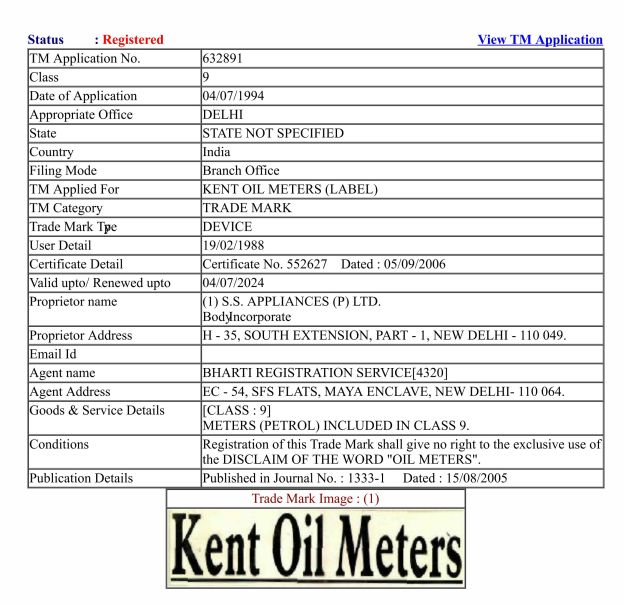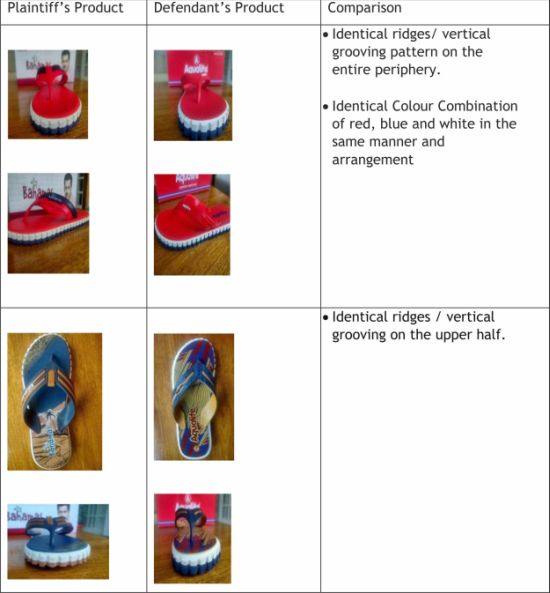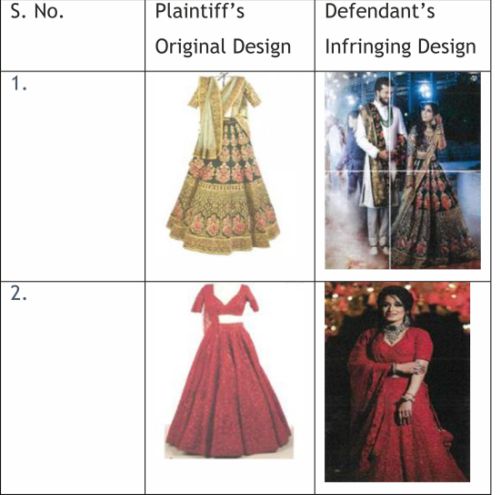TRADEMARKS
'WOODLEY' DECEPTIVELY SIMILAR TO 'WOODS' AND 'WOODLAND'1
The High Court of Delhi (Court) granted permanent injunction against the Defendant from using the word/logo "WOODLEY", "WOODLEY LONDON" and "NUWOODLEY" for being deceptively similar to Plaintiff's word /logo "WOODS", "WOODS (stylized)", "WOODLAND", "WOODLAND LONDON" and "WOODLAND (stylized)".
Mr. Avtar Singh, Mr. Harkirat Singh, Partners, M/s Aero Club (Plaintiff) moved the Court seeking permanent injunction against Sakshi Srivastava (Defndant), from using the word/logo "WOODLEY", "WOODLEY LONDON" and "NUWOODLEY" for being deceptively similar to Plaintiff's word /logo "WOODS", "WOODS (stylized)", "WOODLAND", "WOODLAND LONDON" and "WOODLAND (stylized)".
The Court held that the Plaintiff made out a prima facie case and hence passed an order in their favor thereby granting an ex-parte ad interim injunction against the Defendant. In furtherance to the adverse order passed against them, the Defendant filed an application for setting aside the order passed by the Court.
The Plaintiff claimed exclusive right over the trademarks in as per the common law and the statutory law. The Plaintiff substantiated the claims made by stating the large number of investments made on sales and promotion expenses. The Plaintiff had also opposed Defendant's trademark registration back in 2017.
Further, it is stated that the inclusion of "Carnaby St. London" under the impugned name "WOODLEY" gives a false impression to the consumers and trading public that the Defendant's impugned products and retail stores running under the impugned mark are associated to the Plaintiff's brand WOODS.
The Defendant argued that the Plaintiff does not have a claim over the mark "WOOD" as the same is generic in nature hence is a non-distinctive mark and cannot be registered as a trademark by the Plaintiff. The Defendant further argued that the Plaintiff cannot challenge the impugned mark "WOODLEY" and claim infringement merely because it comprises of the word 'WOOD". The Defendant claimed that the Plaintiff is not in the business of 'Men's Formal Wear' in Tier II and Tier III cities. Therefore, the Defendant cannot be restrained form using the mark for that part of the business.
While concluding the judgment, the Court relied on the applicability of the "anti-dissection rule". The principle of "anti-dissection rule" does not impose an absolute embargo upon the consideration of the constituent elements of a composite mark.
Therefore, it is not improper to examine the features or elements of a mark for the purpose of analyzing the composite marks. The Court further stated that it cannot be denied that the dominant features are significant component as they identifying factor for the customers. The Court further observed that the Plaintiff were, in fact, into the business of 'men's formal wear' in Tier I, Tier II and Tier III cities and therefore the averments made by the Defendant was not accepted.
'KENT METER' INFRINGES 'KENT OIL METER'2
S.S. Appliances (Plaintiff) filed a suit before the High Court of Delhi (Court) to restrain S.N Raju (Defendant), from infringing the trademark of the Plaintiff. The Plaintiff claimed that relief of unfair competition, damages, rendition of accounts, delivery up and other related reliefs.

The Plaintiff is a well-known manufacturer of meters/instruments for conservation and test of oil/petroleum products, and the said meters are sold and marketed under the brand "KENT OIL METER" since 1988. The Plaintiff's trademark "KENT OIL METER" is a registered trademark in class 9, since 1994. The Plaintiff, being aggrieved with the adoption and use of the mark "KENT METERS" by the Defendant, and filing of the same under Class 7 and 9.
It was further stated that the Defendant had applied for registration of mark "KENT METERS" under Class 7 and 9, and the Plaintiff opposed the application filed in class 9, which was not pursued by the Defendant. The Court issued an ex-parte interim injunction restraining the Defendant from using its marks; being deceptively similar to that of the Plaintiff.
TATA COIN/$TATA; RINGS A BELL?3
Tata Sons Limited (Plaintiff) instituted an infringement suit against Hakunamatata Tata Founders (Defendant), before the High Court of Delhi (Court), seeking permanent injunction to restrain the Defendant from using the trademark "TATA" as a part of the domain name for their crypto currency, which is widely available to the public. The trademark "TATA" is a well-known brand in India and outside India, belonging to the Plaintiff for providing financial services including crypto currency. The Defendant particularly deals in crypto currency, under the name "TATA coin" and "$TATA" in US and UK.
The Plaintiff submitted that the crypto currency under the Defendant's impugned mark "TATA coin" and "$TATA" are easily assessable and can be purchased by any person in India through the Defendant's website www.hakunamatata.finance. The Plaintiff further claimed that defendant's website has about minimum 50 visitors from India each day. The Plaintiff further stated that the Defendant operates social media pages by the impugned mark with the intention to target and attract Indian customers towards crypto currency by the mark "TATA coin" and "$TATA", consequently diluting the brand reputation of the Plaintiff.
Nonetheless, the Court observed that above contentions made by the Plaintiff are not sufficient to draw malicious intent behind the Defendant's activities.
Furthermore, the Court observed that the operation of the Trade Marks Act, 1999 and the Code of Civil Procedure, 1908, statutorily extends only to the boundaries of India. The Court further noted that in the case of internet infringements, the decision of the courts can be brought against entities located outside India, subject to existence of a connection between the activity of the foreign-seated defendant and India.
The Court further observed that the Defendant's crypto currency could be purchased using the QR Code by a customer located anywhere in the world hence cannot indicate any conscious targeting of the Indian customer base by the Defendant; therefore, the Court refused to grant an injunction against the Defendant, allowing the suit to be registered.
INJUNCTION ON ACCOUNT OF PRIOR USE GRANTED.4
Aqua Pump Industries (Plaintiff), moved the High Court of Delhi (Court) to restrain Ashok Kumar Jaiswal (Defendant) in the matter, from wrongfully using the mark "AQUA GROUP INDUSTRIES" on their product. The Defendant was manufacturing, selling and distributing goods such as Submersible Pumps, Electric Motors along with the related spares and other similar products under the mark "AQUA GROUP" and by entity name "AQUA GROUP INDUSTRIES".
The Plaintiff adopted the mark "AQUA GROUP INDUSTRIES" since the year 1974 and has been in use since then. The Plaintiff did not dispute the use of trade mark "AQUA MARSHA" by the Defendant. However, the use of the trade name or mark "AQUA GROUP INDUSTRIES" by the Defendant was bound to cause confusion and deception in the mind of general public. Hence the Plaintiff filed for permanent injunction against the impugned mark, as the Plaintiff's marks 'AQUA SUB', 'AQUASUB ENGINEERING', 'AQUAPUMP' AND 'AQUAPUMP INDUSTRIES' AND 'AQUATEX' are identified as a source of Plaintiff's business.
The Court, based on the submission, observed that the impugned mark deceptively resembled the Plaintiff's mark and therefore granted the permanent injunction against the Defendant's impugned mark.
RIGHTS OF PRIOR USER FAVOURED OVER PRIOR REGISTRATION OF THE TRADEMARK5
The High Court of Delhi (Court) upheld the Trial Court decision, thereby dismissing Vikas Gupta's (Plaintiff) application for permanent injunction against the defendant use of impugned mark "NEHA", and further allowing the application of Sahni Cosmetics (Defendant) under Order XXXIX Rule 4 Code of Civil Procedure, 1908.
The Court observed that the defendant successfully established usage of the mark "NEHA" for a substantial period of time prior to filing of the suit by the Plaintiff, by way of sale invoices dating back to the year 2003; 15 years prior to the filing of the suit.
The Court observed that the claims of the Defendant showing market presence since 1990, could not be overlooked. Hence the Court upheld the Trial Court decision that Section 34 of the Trade Marks Act, 1999, comes into picture and rights of the prior user prevails over prior registration, i.e. in favour of the Defendant.
The Court disposed-off the appeal while confirming the interim order requiring the Defendant to maintain accounts, to be placed before the Trial Court from time to time.
COPYRIGHT
BROADCASTING RIGHTS FOR ICC MEN'S T20 WORLD CUP 2021 VESTS EXCLUSIVELY WITH STAR TV6
Star India Private Limited (Plaintiff) filed an infringement suit before the High Court of Delhi (Court) claiming infringement of Plaintiffs' broadcasting and reproduction rights for the upcoming ICC Men's T20 World Cup 2021, against filmyclub.wapkiz.com and number of other rogue websites (Defendant).
The Plaintiff claimed to have exclusive broadcasting and reproduction rights for the upcoming ICC Men's T20 World Cup 2021, by way of acquiring exclusive global media rights including television rights, digital rights (internet as well as mobile) and certain ancillary rights for various ICC events inter alia the ICC Men's T20 World Cup from the International Cricket Council for a fixed term of eight years starting from 2015, in exchange of a substantial consideration, as decided in the 'Media Rights Agreement' dated 20 November 2014.
The Plaintiff alleged that the said act of the Defendant has infringed the Plaintiffs' exclusive broadcasting and reproduction rights, including its exclusive rights with respect to Vivo IPL 2021 and further apprehend that the Defendant shall continue to infringe the Plaintiffs' exclusive broadcasting and reproduction rights with respect to the ICC Men's T20 World Cup 2021, starting 17 October 2021. These rights also include the exclusive rights to use the ICC Men's T20 World Cup 2021 logos, the logos of the Star Channels and any other marks associated with the Men's T20 World Cup event.
The Court observed balance of convenience was in favour of the Plaintiff hence to safeguard the Plaintiff from suffering losses, passed ex-parte ad interim injunction. The Defendant has been restrained from carrying out the infringing activities of thereby blocking the access to their content and further directed the Plaintiff to file an affidavit in the event any such infringing activity is carried out by the Defendant as pleaded in the present suit, enclosing screenshots evidencing the infringing content as broadcasted on such websites.
THE PAYMENT OF CONSIDERATION NOT A MANDATORY CONDITION PRECEDENT TO THE ASSIGNMENT TAKING EFFECT.7
Mr. C. Prakash (Plaintiff) claimed that S.N. Media (Defendant), was assigned with their copyright as producers of two films - Chingari and Shrikanta, in favor of the Plaintiff in respect of the Tamil and Malayalam language digital dubbing and non-theatrical rights, meaning thereby that the Plaintiff was entitled to digitally release the films dubbed in Tamil and Kannada without any rights to release the films dubbed in Tamil or Kannada in any theatre.
The issue raised before the High Court of Madras (Court) was whether if the assignments claimed by Plaintiff would lose its relevance merely due to non-payment of consideration by Plaintiff.
As per Section 19 (3) of the Copyright Act, 1957, it is essential for an assignment to clearly specify the amount of royalty or other consideration payable. Nonetheless, the provision does not make the payment of consideration mandatory as a condition precedent to the assignment taking effect.
The Court held that, even if the Plaintiff herein did not take any consideration for obtaining the assignment in the copyright pertaining to the relevant films, the Plaintiff would still be entitled to assert the their ownership in respect of the partial assignment made in favour of the them, as the partial owner. The Plaintiff has the right to restrain all others from exploiting the same right as such exploitation would amount to infringement within the meaning of the Copyright Act, 1957.
The Court held that Plaintiff was entitled to an injunction.
FRANCHISE AGREEMENT
FRANCHISEE CONTINUE TO INFRINGE FRANCHISOR'S RIGHTS; POST TERMINATION OF THE FRANCHISE AGREEMENT8
The Khambadkone Meera Rao (Plaintiff) filed a suit for permanent injunction restraining Rathina Pandian Selva (Defendant), his men and agents, etc., in the High Court of Madras (Court), from using the software alleged to have been conceptualized and developed by the Plaintiff's late husband Mr. K. Muralidar Rao.
The said software provided databases to the clients particularly shipping companies in respect of imports and exports. Plaintiff and her husband decided to leave for Australia and to keep the business running smoothly, Plaintiff and her husband entered into a franchise agreement with Defendant for a period of 3 years. The business was taken over as "RITASS a Franchisee of Khambadkones" and was run in the name of "RITASS" along with Plaintiff's infrastructure and clientele without any investment, except the promise to pay a monthly franchise fee.
However, 3 year prior to the expiration franchise period, Plaintiff asked the Defendant to discontinue the business carried out as per the franchisee and to handover the essential details such as data collected and the subscriber's details.
In view of the request made by the Plaintiff, the Defendant instantaneously surrendered the franchise business including the Khambadkones software program, annual and monthly statistics, shipping line contract details, and tally backup, and cheque books. Defendant stopped the payment of franchise fee. Nevertheless, the Defendant continued to the collecting data and processing in the name of RITASS through the Khambadkone software and also continued to use the email id containing the word "KAMBAD", at Mumbai".
Issue raised in the present case was whether the continuation of the business and usage of the software, which was developed and used by Plaintiff, even after the termination of Franchise Agreement, amounts to infringement by the Defendant or not.
The Court was of the opinion that the Defendant should have stopped using the business model and the software, instead Defendant continuously used the same software, identical to that of the Plaintiff as the new software alleged to have been introduced by the Defendant, infringed the Plaintiff's software.
The Court held that it was a prima facie case for infringement of copyright, hence, the injunction sought by Plaintiff was allowed by the Court. In furtherance to that, the Court stated that there shall be no limitation on the Defendant to adopt any different version of software with no resemblance of the software developed by the Plaintiff.
DESIGNS
HIGH COURT OF DELHI GRANTED INJUNCTION IN FAVOR OF RELAXO FOOTWEAR.9
Aqualite Industries Private Limited (Defendant) was involved in marketing the Footwears i.e., slippers with vertical ridges and grooves pattern on its periphery (Impugned Products). Since the design of the Impugned Products were already registered vide registration nos. 325071, 325074 (Registered Designs), under the Designs Act, 2000, by Relaxo Footwears Limited (Plaintiff), a design infringement suit was filed by the Plaintiff against the Defendant before the High Court of Delhi (Court).
The Plaintiff sought an ex-parte injunction to restrain the Defendant from manufacturing, selling, or advertising the Impugned Products.
Since 1977, the Plaintiff is producing footwear and has emerged as the largest footwear producer in India. The Plaintiff's has marketed their products under numerous distinctive trademarks/labels along with distinguishable get up and trade dress which includes the house mark RELAXO and specific brands like BAHAMAS, FLITE, SPARX, SCHOOLMATE, etc. The Plaintiff has acquired distinct reputation not only within India but in various countries such as UAE, Bahrain, Australia, etc., subject to the long and continuous usage.
The Plaintiff gained knowledge of the impugned goods in the Delhi markets. A comparison of the two products, namely, of the Plaintiff and of the Defendant are as follows:

The Plaintiff claimed that the Defendant was a habitual infringer as Plaintiff had instituted suits before the Court in the past.
Whilst passing the order, the Court compared the Plaintiff's Registered Products and the Impugned Products of the Defendant and opined that a visual inspection of the two designs shows deceptive similarity as the essential features of the designs of the Plaintiff have been copied the Defendant. The Defendant was restrained from using the Impugned Products on which Registered designs of the plaintiff or any other design that is deceptively similar to the designs of the plaintiff has been applied
SABYASACHI MUKHERJEE SUES ASIANA COUTURE FOR DESIGN INFRINGEMENT10
The Indian fashion industry ace, Sabyasachi Calcutta LLP (Plaintiff) has filed, a design infringement suit against Mr. Ankit Keyal Proprietor Asiana Couture & Ors. (Defendant) before the High Court of Delhi (Court). The Plaintiff filed the suit in the Court restraining Defendant from infringing the designs, which are marketed by Plaintiff under the names, "Rusheeda Lehenga" (Reg. No. 85668) and "New Botanical Lehenga/ P.C. Lehenga" (Reg. No. 83943).

Plaintiff claimed that in respect of both designs, the registration attests to novelty with respect to all views of the design, i.e. the front view, the back view, the left side view and the right side view. In all views, for both designs, the registration attests to novelty residing in the surface ornamentation of the garment set. Plaintiff claims that Defendant has been using a design, which is similar to the registered designs of Plaintiff as to constitute piracy.
The Court observed that the defendant using designs which were deceptive imitation of the plaintiff's design thereby misrepresenting a possible link with the Plaintiff's business. Therefore, the Court issued an injunction restraining Defendant from infringing the registered designs of PLAINTIFF.
HIGH COURT OF DELHI GRANTS PERMANENT INJUNCTION POST INTERIM INJUNCTION11
A permanent injunction was sought by E.N. Project and Engineering Industries Private Limited (Plaintiff), in High Court of Delhi (Court), against KVT Electrical Project and Engineering (Defendant) against the infringement of Plaintiff's registered design.
The Plaintiff is registrant of designs used in respect to the manufacturing cable trays used in number of industries and, for the said Product since 2010, under Section 6 of the Designs Act, 2000.
The Plaintiff claimed that the Defendant was manufacturing and marketing product which was an imitation of the Plaintiff's registered design. The Plaintiff also alleged that the Defendant, being the prior distributor of Plaintiff's products, was carrying out the activity maliciously.
Earlier, also in this case, an interim injunction was granted in favour of the Plaintiff and in response, the Defendant filed the present application, taking objection to the grant of design registration in favour of the Plaintiff on the grounds available for cancellation of Design. The suit was hence transferred to the Court from the Sessions Court.
The Defendant targeted the Registrability of Plaintiff's design by challenging the novelty of the same. In respect to the same, onus to establish novelty in a design is on the applicant when filing the application, however, once the registration is granted, the onus of substantiating the claim of 'prior publication' shifts on the Opponent challenging the registration of the said design.
The Court held that the Defendant failed to submit any relevant evidence in support of their objection against the Plaintiff's registered design. Moreover, were unsuccessful in denying the Plaintiff's averment stating that the Defendant was its erstwhile distributor. The Court stated that Defendant's conduct was unsatisfactory and that it would have been a different scenario if the Defendant had adopted its own design and defended the same by claiming it to be distinguished from the Plaintiff's design; no such attempt was made by the Defendant and rather the similarity with the Plaintiff's design was candidly admitted.
In view of the above, it was held that the Defendant's adoption of the Plaintiff's design was dishonest. Accordingly, no case was made out for vacation of the earlier injunction order and consequently the present application filed by the Defendant was dismissed by the Court. The application filed by the Plaintiff was disposed-off by making the earlier injunction order absolute.
Footnotes
1. Avtar Singh & Ors. vs Sakshi Srivastava & Anr. (CS(COMM) 385/2020).
2. S.S. Appliances Pvt. Ltd. & Anr vs S.N. Raju (CS(COMM) 502/2021).
3. Tata Sons Private Limited vs Hakunamatata Tata Founders, (CS(COMM) 316/2021 & I.A.8000/2021.
4. Aqua Pump Industries and ors v. Ashok Kumar Jaiswal and ors (C.S.No.299 of 2020 and O.A.Nos.564 & 565 of 2020 and A.No.2603 of 2020.
5. Vikas Gupta & Anr v. M/s Sahni Cosmetics, (FAO (COMM) 144/2021 and C.M. Nos.55627/2019 & 55628/2019).
6. Star India Pvt. Ltd. And Anr vs Filmyclub.Wapkiz.Com And Ors, CS(COMM) 518/2021.
7. C. Prakash Vs. S.N. Media and Others 10 OSA (CAD) No.68 of 2021.
8. Khambadkone Meera Rao, Represented through her Power of Attorney, Jyoti Rao, Bangalore v/s Rathina Pandian Selvan, Prop. of RITASS Mumbai, Chennai, O.A. Nos. 396 & 398 of 2019 in C.S. No. 263 of 2019
9. Relaxo Footwears Limited vs Aqualite Industries Pvt Limited, CS(COMM) 190/2021.
10. Sabyasachi Calcutta LLP Vs. Mr. Ankit Keyal Proprietor Asiana Couture & Ors, CS(COMM) 533/2021.
11. E.N. Project And Engineering INDUSTRIES (P) LTD. AND Anr vs Kvt Electrical Project And Anr, CS (COMM) 262/2020.
The content of this article is intended to provide a general guide to the subject matter. Specialist advice should be sought about your specific circumstances.

